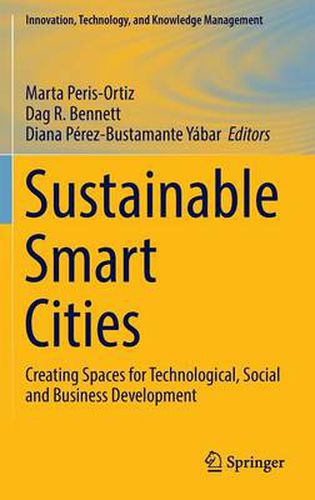Readings Newsletter
Become a Readings Member to make your shopping experience even easier.
Sign in or sign up for free!
You’re not far away from qualifying for FREE standard shipping within Australia
You’ve qualified for FREE standard shipping within Australia
The cart is loading…






This title is printed to order. This book may have been self-published. If so, we cannot guarantee the quality of the content. In the main most books will have gone through the editing process however some may not. We therefore suggest that you be aware of this before ordering this book. If in doubt check either the author or publisher’s details as we are unable to accept any returns unless they are faulty. Please contact us if you have any questions.
This volume provides the most current research on smart cities. Specifically, it focuses on the economic development and sustainability of smart cities and examines how to transform older industrial cities into sustainable smart cities. It aims to identify the role of the following elements in the creation and management of smart cities:* Citizen participation and empowerment * Value creation mechanisms * Public administration* Quality of life and sustainability* Democracy* ICT* Private initiatives and entrepreneurship Regardless of their size, all cities are ultimately agglomerations of people and institutions. Agglomeration economies make it possible to attain minimum efficiencies of scale in the organization and delivery of services. However, the economic benefits do not constitute the main advantage of a city. A city’s status rests on three dimensions: (1) political impetus, which is the result of citizens’ participation and the public administration’s agenda; (2) applications derived from technological advances (especially in ICT); and (3) cooperation between public and private initiatives in business development and entrepreneurship. These three dimensions determine which resources are necessary to create smart cities. But a smart city, ideal in the way it channels and resolves technological, social and economic-growth issues, requires many additional elements to function at a high-performance level, such as culture (an environment that empowers and engages citizens) and physical infrastructure designed to foster competition and collaboration, encourage new ideas and actions, and set the stage for new business creation.
Featuring contributions with models, tools and cases from around the world, this book will be a valuable resource for researchers, students, academics, professionals and policymakers interested in smart cities.
$9.00 standard shipping within Australia
FREE standard shipping within Australia for orders over $100.00
Express & International shipping calculated at checkout
This title is printed to order. This book may have been self-published. If so, we cannot guarantee the quality of the content. In the main most books will have gone through the editing process however some may not. We therefore suggest that you be aware of this before ordering this book. If in doubt check either the author or publisher’s details as we are unable to accept any returns unless they are faulty. Please contact us if you have any questions.
This volume provides the most current research on smart cities. Specifically, it focuses on the economic development and sustainability of smart cities and examines how to transform older industrial cities into sustainable smart cities. It aims to identify the role of the following elements in the creation and management of smart cities:* Citizen participation and empowerment * Value creation mechanisms * Public administration* Quality of life and sustainability* Democracy* ICT* Private initiatives and entrepreneurship Regardless of their size, all cities are ultimately agglomerations of people and institutions. Agglomeration economies make it possible to attain minimum efficiencies of scale in the organization and delivery of services. However, the economic benefits do not constitute the main advantage of a city. A city’s status rests on three dimensions: (1) political impetus, which is the result of citizens’ participation and the public administration’s agenda; (2) applications derived from technological advances (especially in ICT); and (3) cooperation between public and private initiatives in business development and entrepreneurship. These three dimensions determine which resources are necessary to create smart cities. But a smart city, ideal in the way it channels and resolves technological, social and economic-growth issues, requires many additional elements to function at a high-performance level, such as culture (an environment that empowers and engages citizens) and physical infrastructure designed to foster competition and collaboration, encourage new ideas and actions, and set the stage for new business creation.
Featuring contributions with models, tools and cases from around the world, this book will be a valuable resource for researchers, students, academics, professionals and policymakers interested in smart cities.